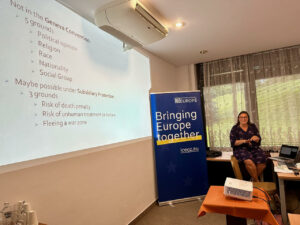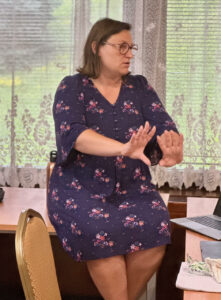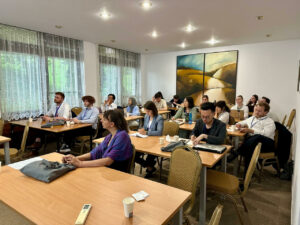Beyond Borders: Migration, Myths and Media Training for students & journalists by Désinfox Migrations
Bratislava, 26.6.2024
On June 26, 2024, Tania Racho from Desinfox-Migrations delivered an insightful presentation on the complex and often misunderstood topic of migration and asylum in the European Union (EU). Held as part of an ongoing effort to foster a well-informed and data based public debate, the training addressed several critical aspects of migration and asylum, providing attendees with a rich, data-driven understanding of the issues at hand.
Desinfox-Migrations is a French association committed to enhancing public discourse on migration through scientific facts and objective analysis, collaborating with the Institut Convergences Migrations. Since its inception in 2018, Desinfox-Migrations has been bringing together journalists, researchers, and non-profit professionals to debunk myths and misinformation in order to provide clarity on migration and asylum topics.
The training included key topics on migration and asylum, such as political and media – generated coverage of migration and asylum topics, migration discourse generally used by the politics, EU and media, while illustrating and enlightening us on the migration recent data, figures as well as social and economic conditions migrants face upon entering the EU member states.
The presentation began by exploring how political speech and media coverage shape public perception of migration and asylum. Tania Racho highlighted the rhetoric used during so-called ‘refugee crises,’ touching upon the use of the discourse around the word ‘crisis’ itself, while also examining how politicians leverage the term “migration” for various political gains. This part of the presentation underscored the importance of critical thinking and media literacy, encouraging the audience to scrutinise the information presented to them.
The presentation then delved into the numbers and data surrounding migration in the EU. Tania Racho presented data to demystify common misconceptions, such as the scale of migration and its impact on host countries. By offering a factual basis, she aimed to correct widespread misinformation and provide a grounded perspective on migration trends in the EU.
Looking into the real numbers and data provided a logical base for understanding the root causes of migration. Tania Racho discussed the myriad factors driving people to immigrate but also emigrate back to their original countries. She also touched on the Geneva Convention’s role in protecting refugees, emphasising the precarious conditions and laws that surround immigrants upon entering the European Union member states.
Lastly, Tania Racho addressed the criminalization of migrants. She discussed how legal and political frameworks often unfairly portray migrants as a threat, exacerbating xenophobia, leading to harsh policies. This segment called for a more humane and just approach to migration, advocating for policies based on respect and human rights.
Desinfox-Migrations continues to build a robust platform for monitoring and contributing to the public debate on migration. The organisation remains dedicated to providing high-quality, scientifically-backed information to ensure that political leaders, media and citizens engage with migration and asylum topics in general in a measured and objective manner. As the public debate on migration continues to evolve, initiatives like those by Desinfox-Migrations are crucial in promoting a more informed, compassionate, and objective discourse, paving the way for policies that respect human dignity and foster social cohesion.


